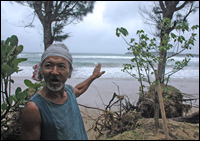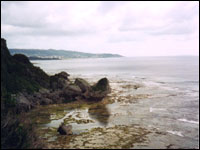Japan
-
Is too few people the new “population problem”?
Alston wants your women. All’s quiet on the Alston front. Photo: www.visitcumbria.com. And not just any old hags, either — residents of this northern English town would prefer strapping young things who aren’t afraid to get dirty. “Quite frankly, old people are not going to give us the vitality that we need,” says Vince Peart, […]
-
Japanese fishermen slaughter their competition
All over the world people are feeling the effects of overfishing. While I would personally advocate not eating fish to begin with, others have come up with alternative solutions, from establishing sustainably managed fisheries to launching campaigns educating the public on what fish to consume.
And then there is this:
In the Japanese fishing village of Taiji, fishermen are rounding up and slaughtering hundreds and even thousands of dolphins right now.
After driving pods of dolphins into shallow coves, the fishermen kill the dolphins, slashing their throats with knives or stabbing them with spears. Thrashing about, the dolphins take as long as six minutes to die. The water turns red with their blood and the air fills with their screams.
This brutal massacre -- the largest scale dolphin kill in the world -- goes on for six months of every year. Even more shocking, the captive dolphin industry is an accomplice to the kill.Way to go fellas -- violence and murder is always the easiest solution, isn't it? Who's next after you wipe out all of your non-human competition?
If you would like to do something, One Voice, the Earth Island Institute, and the Elsa Nature Conservancy have a few options on their website.
-
Japanese buyers buy up Patagonia’s eco-themed t-shirts
Patagonia Japan introduced a line of organic cotton t-shirts in January that sported messages on the front and back addressing environmental problems in various regions of the country. They donated $5 from the price of each shirt to Japanese environmental groups. The t-shirt line was completely sold out by the end of March.
I don't know a lot about the political climate in Japan with regard to environmental issues, so I can't tell if this is a great success story or not. Is this a triumph for environmental awareness or a triumph for the latest materialistic shopping fad? I guess I would argue it's positive either way, because some of the profits are going toward environmental and conservation goals, and it's raising awareness.
At the same time, however, I don't think that a similarly themed line of clothing would ever meet with such success in the U.S. (go ahead and prove me wrong if such a thing already exists). Wearing a shirt supporting the cleanup of a Superfund site or the protection of a wilderness area immediately labels you as a leftist enviro-lunatic in this country. Which may be fine for some of us, but we're not going to set any sales records ...
-
Japanese dress down to save 81 million gallons of oil in summer
What do you do if your country needs to meet targets under the Kyoto global warming protocol? You dress down.
Yup, the Japanese government is encouraging public workers to wear less in order to use less oil. Since many in Japan don dark suits in summer, they crank up the AC to maintain an average temperature of 77 degrees. Someone figured out that Japan could save 81 million gallons of oil in one summer by setting the temperature at 82. To make the warmer workplace more bearable, employees now have the okay to wear short sleeves and go sans tie.
However, one possible unintended consequence of this move is that shirt sales are up. I'm guessing that they are not organic.
-
A new resort complex threatens a Japanese paradise
The elusive and endangered yamaneko. Photo: Makoto Yokotsuka. The Iriomote cat is a survivor. For centuries, it employed the surest survival technique of all — avoiding humans — before being scientifically described for the first time in 1967 by Dr. Yoshimori Imaizumi of Tokyo’s National Science Museum. Its home, Iriomote Island, is one of the […]
-
On climate change, other nations get cracking while the U.S. is slacking
The recent Milan conference on the Kyoto Protocol started out with a bang — a commotion of rumors about Russia’s ratification of the treaty — and went out with a whimper, offering no clear signal that the landmark accord on climate change would ever become international law. But one important development became clear amidst the […]
-
Okinawan sea life likely to suffer under Navy sonar deal
Every year, scuba divers make tens of thousands of excursions into the waters off Okinawa, Japan, drawn by the spectacular array of sea life on display. Soon, though, that sea life may be blasted out of the water by an unwelcome sonic barrage. The Okinawan coast is not clear. Photo: Jeff Shaw. Almost everywhere in […]
-
Paper Chase
a 50 percent increase in worldwide paper consumption is expected by 2010 115 billion sheets of paper are used annually for personal computers 700 pounds of paper are consumed by the average American each year 10,000 trees are cut down annually in China to make holiday cards 3 cubic yards of landfill space can be […]
-
Do the Right Thing
I’ve been bewailing the short-term, sound-bite, soul-less way in which the U.S. media greeted the turn not only of a century, but of a millennium. (You know — lists of the top 10 athletes of the century, ads for the soft drink of the new millennium.) Then in from the Internet came welcome news of […]


